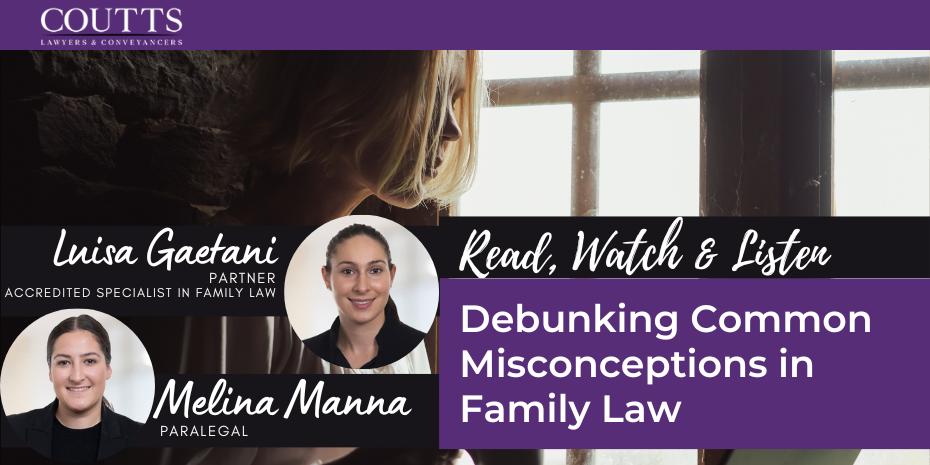Co-authored by Melina Manna
KEY TAKE OUTS:
- There are a number of misconceptions in Family Law.
- The Court will always rule in the best interests of the child when it comes to parenting matters.
- Resolving a dispute outside of Court saves time and costs.
There are numerous misconceptions that arise in relation to Family Law. These misconceptions often arise due to experiences of friends or family, the internet and even television shows or movies. These misconceptions do not accurately represent the legal system and in this article, we will look to break down the common misconceptions in Family Law.
Do Courts Always Favour Mothers in Parenting Matters?
There is a common misconception that the Court will rule in favour of mothers and grant them custody of the child, however, this is incorrect. The Court will rule in favour of the best interests of the child under section 60CA of the Family Law Act 1975 (Cth). The Court will determine what is in the child’s best interest under section 60CC which sets out a range of factors that the Court must consider.
This provision sets out primary considerations which include the benefit to the child to have a meaningful relationship with both parents and the need to protect the child from any physical or psychological harm. The provision also sets out additional considerations that the Court will consider, and these include but are not limited to, the views expressed by the child, the nature of the relationship that child has with both parents and any other persons such as grandparents or relatives, and any family violence involving the child or the child’s family member.
These are all factors that the Court will take into consideration when determining custody arrangements. Although it may appear that the Court favours mothers in parenting matters, the Court will consider all factors set out in section 60CC in order to determine what is in the child’s best interests.
Is a 50/50 Asset Split Automatic After Separation?
Many people believe that if they separate from their partner, they are automatically entitled to a 50/50 split of the asset pool. This is not accurate as the Court takes into account a range of factors to ensure the asset pool has been split just and equitable between the parties. The first step in determining how to split the property pool is to determine what falls within the pool. Once it has been determined what falls within the pool, the Court will take into account multiple factors before splitting it.
These factors include the financial contributions made by each party, the non-financial contributions made by each party and the homemaker contributions made by each party. Once this has been determined, the Court will assess if any adjustments are needed based on any future needs the parties may have. Once the above factors have been determined, the Court will award the split by ensuring that it is just and equitable for the parties.
Can Children Decide Where They Live After Separation?
When parties separate, children may have a strong opinion on which parent they would rather live with. The Court will always rule in favour of the best interests of the child and although the child may state where they want to live, the court will not automatically grant this. Under section 66CD of the Family Law Act, the Court will take into account the views of the child, however, the Court will decide what is in the child’s best interests. The best interest of the child often includes having a shared living arrangement to ensure that the child continues to have a meaningful relationship with both parents. The court will take into account the wishes of the child, however, ultimately, the Court will decide what is in their best interests which often includes shared living arrangements – but not necessarily equal time arrangements.
Is Going to Court the Only Way to Settle Family Matters?
There is a common misconception that in order to settle any family matter such as divorce or custody arrangements, the matter must go to court. Family matters are not able to proceed to Court unless the parties have first sought out to resolve their dispute through family dispute resolution under section 60I of the Family Law Act 1975 (Cth). The only exception to not proceeding with family dispute resolution methods is if there has been child abuse or family violence under section 60J.
It is often advisable that parties do not proceed to court and instead settle the matter through family dispute resolution due to the high costs involved when going to court. The most common family dispute resolution method is mediation which sees the parties come together with a mediator in order to come to an agreement. Many parties are able to resolve their dispute during mediation and avoid Court altogether. This saves both parties time and money as it is cheaper and quicker to solve a dispute through mediation than it is going to Court.
Need Expert Guidance in Navigating Family Law?
Navigating the complexities of Family Law can be challenging and emotionally taxing. Whether you’re dealing with custody matters, asset division, or any family dispute, it’s crucial to have the right legal support by your side.
At Coutts Lawyers and Conveyancers, we understand the intricacies of Family Law and are dedicated to providing you with compassionate and comprehensive legal assistance. Our team of experienced professionals is here to guide you through every step, ensuring your rights are protected and your voice is heard.
Why Choose Coutts for Your Family Law Matters?
- Accredited Expertise: Luisa Gaetani is not just well-versed in Family Law; she’s an accredited Family Law Specialist with a depth of experience in the field.
- Personalised Approach: We tailor our services to meet your unique needs and circumstances.
- Cost-Effective Solutions: We strive to resolve disputes efficiently, aiming to save you time and money.
Contact Us Today
- Struggling with a family law issue?
- Need advice on your rights and options?
- Want to resolve matters without unnecessary stress?
Let Coutts be your trusted legal partner. Reach out to us for a consultation and take the first step towards a resolution. Your peace of mind is our priority.
ABOUT LUISA GAETANI:
Luisa is a distinguished Partner and Accredited Family Law Specialist at Coutts who proudly leads our esteemed Family Law team. Luisa started University in 2010 and commenced as a Paralegal and since her admission in 2014, Luisa has dedicated her practice exclusively to Family & Criminal Law, showcasing a deep commitment to providing comprehensive legal support.
For further information please don’t hesitate to contact:
Luisa Gaetani
Partner
Accredited Specialist in Family Law
info@couttslegal.com.au
1300 268 887
ABOUT MELINA MANNA:

Melina joined the Coutts team in May 2023 as a Paralegal, working in our Criminal & Family law teams, from our Narellan office. She has now transitioned into a Law Graduate role with hopes of being admitted into the legal profession as a Lawyer in 2024.
Melina is passionate about the law and strives to deepen her knowledge. She looks forward to one day practicing as a Lawyer at Coutts.
For further information please don’t hesitate to contact:
Melina Manna
Paralegal
info@couttslegal.com.au
1300 268 887
Contact Coutts today.
This blog is merely general and non-specific information on the subject matter and is not and should not be considered or relied on as legal advice. Coutts is not responsible for any cost, expense, loss or liability whatsoever to this blog, including all or any reliance on this blog or use or application of this blog by you.




